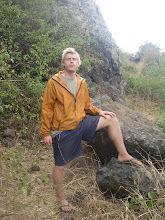Numb
“Teacher, can we please learn how to design a house? If we go to university next year and they ask us to draw a house, we’re not going to know anything because all you’re teaching us are these solar projects.”
I froze. Natalino tracked me down in the praza. I had just gotten out of a hiace coming from Praia. For the last 24 hours, I had spoken at length with several big people in Praia about the progress of several solar projects Nick started last year and I had continued to develop in his absence.
My head was swelling from the good response I received. However, what Natalino said to me changed everything. “We’ll talk tomorrow in class. You have no idea how much I appreciate you telling me this.”
My student pulling me aside outside of class to ask me to change the curriculum tells me several things:
First, he cares about school and about preparing himself for university. I can’t imagine he’s the only student who feels like way either.
Second, I’m wrong. I was so obsessed with imposing these projects on my community and teaching people how to build them, I forgot about my primary objective at school – following the state-mandated syllabus.
This realization was devastating to me. How simple my mistake and how terribly out of place I have been in the last few weeks.
The next day, my director sat me down and said essentially the same thing. “You’ve got to follow the syllabus. These projects you want to do, they are extracurricular. Your job is to prepare students for university and these projects do not fit into that paradigm.”
Rightly humiliated, I spent the rest of the day upset at myself for having lost sight of my responsibility.
While most Peace Corps Volunteer’s service involves experiencing life in a completely different environment, my service has been quite different: I have most of the amenities available in the US – electricity and running water (most of the time)… even the Internet in my house. Also, the semi-urban/rural Assomada setting is a lot like the Atlanta suburb I grew up in the States – not quite a city, not quite the bush.
What I’m getting most out of this experience is how to work with people: Americans and Capeverdeans. To work in an organization, there are certain rules you must follow. If you have anything more to add, it is extremely important to bring those ideas to the table at the right time and the right place.
The relationship between my community and I is like the relationship between a client and a business. I’m here to serve my community. It just so happens the ideas I’m presenting to my community are things they’ve never heard of. And, before a year ago, neither had I. But, just as a business can’t impose it’s new ideas on their clients, I must be very strategic at how I present the ideas I wish to bring to my community. They must accept the ideas for any success to come of them. If they don’t completely accept the idea, the idea has little value.
In the Peace Corps, this concept is monumentally more difficult than your average business/client relationship. For example, if people have water coming from wells or desalination plants, why should they consider a new way to get water? They already have water. In this example, we are challenged with first convincing the community that water supply is a problem, research the technology to see what design works best, convince people it works, teach them to do it and finally watch them do it on their own.
With the solar still project, we’re somewhere between step 1 and 2. People kind of think understand there is a problem, and they’re somewhat interested in helping research. But because of the scale of work involved, there’s not much more interest above helping out or watching.
This theory is applicable in almost every situation: both the problem and the solution must be conveyed to people who don’t even see a problem.
You’re presenting a new, untested in some cases, technology to people who don’t even understand there is a problem. So it’s like your telling your client he should buy something for reasons he doesn’t understand.
In this case though, my clients are right. I was wrong to skip over the state-mandated curriculum. I need to get creative in how I present these new ideas. I guess it's back to the drawing board.




3 comments:
Reminds me of Dr. Ulick's class, building houses that is. Bri, keep your head up, you are a hero to those folks I am sure.
for the posts i've read it seems you work at escola técnica grão-duque henri, is that right?
i studied there and it was a great time. Now i study computer engineer in Brazil.
I was searching on the web for news from my school and found your sollar still project. I think your doing a great job bringing this stuff for students. Off course that following the syllabus is important, but I think that this kind of project can give students a broader understanding of technology related to their fields of study, besides some students may not have the chance to go a college and you're providing tools for them, not only to build houses, but maybe solve some problems that their communities may face soon or later.
Post a Comment